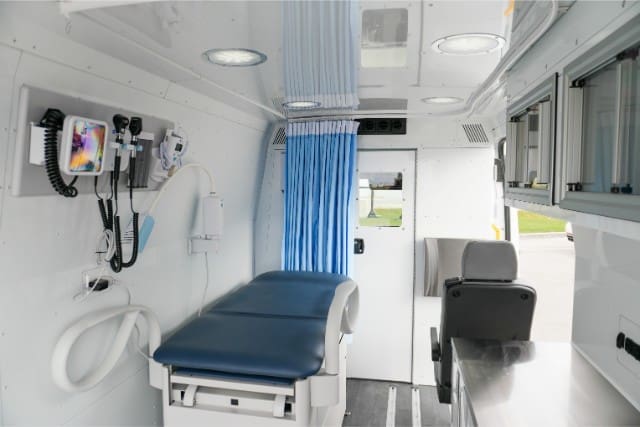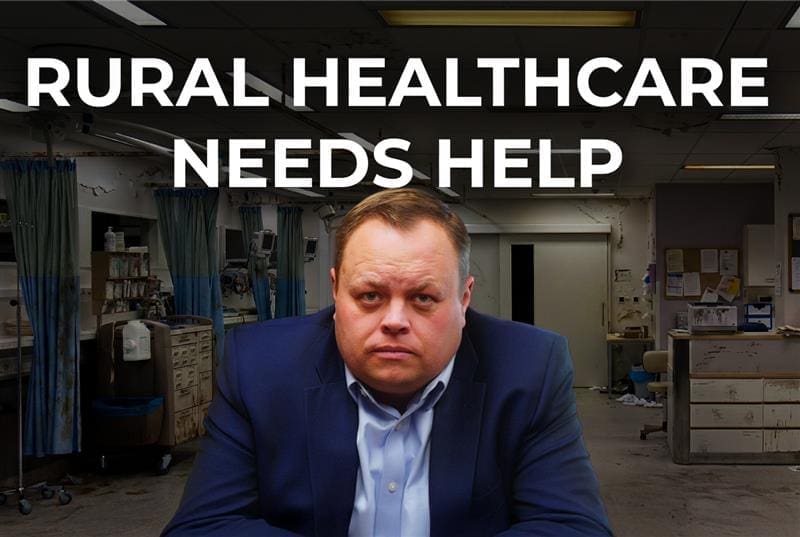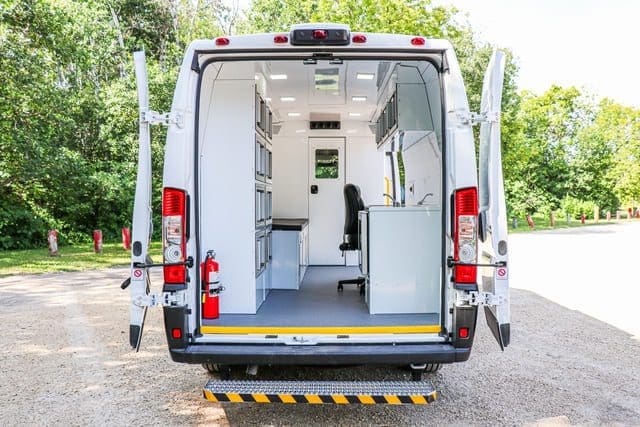Nearly 20% of Texans live in rural areas with little access to healthcare. That means millions of people drive hours just to see a doctor. If you run a health program or a non-profit in Texas, you probably feel this problem every day. You might be thinking about opening a clinic, but you worry about the cost, the long wait times, or the rules for fixed buildings.
The big question is: Should you pick a mobile clinic in Texas instead? Many organizations face this tough choice. A fixed clinic stays in one place, but many patients live far away. That leaves rural communities without healthcare. This gap means people suffer longer, and your program might not reach everyone who needs help.
At AVAN Mobility, we have built mobile clinics for over 10 years. We hold Ford QVM and Stellantis QPro certifications. We’ve worked with organizations like Pacific Clinics and many others who want to serve Texas communities better. We listen carefully and design vehicles that support comfort, safety, and respect for patients.
We know we are not the only choice. But we take pride in helping organizations reach more people and save lives.
In this article, you’ll find:
- The pros and cons of mobile clinics and fixed clinics
- Why mobile clinics work well in Texas
- How to decide which option is right for your organization
Next, let’s take a closer look at each option and its pros and cons.
What are the pros and cons of mobile clinics vs. fixed-site clinics in Texas?
The table below will help you spot the gaps and figure out what fits your program and the people you serve.
| Feature | Mobile clinic in Texas | Fixed site clinic |
| Reach and access | Can visit remote places like the Texas Hill Country or West Texas, where clinics are rare. Mobile healthcare in Texas brings care closer to those who travel hours otherwise. | Limited to one spot, which can be hard for rural Texans or big cities like Houston with traffic problems. |
| Cost | Lower start-up cost since no building is needed. Saves money on rent and utilities. | High costs for building, maintenance, and utilities. Plus, remodeling to meet healthcare rules can add up. |
| Flexibility | You can change routes based on community needs, like moving to Houston’s east side one week, then rural areas the next. | Fixed clinics stay put, which can leave gaps where people live far away or can’t get there easily. |
| Patient comfort | Can feel less formal and more personal. Some people prefer a mobile health unit in Texas because it feels friendlier and less scary. | Offers more privacy and space for equipment. Good for longer treatments and complex care. |
| Regulations and setup | Needs to follow special vehicle and medical rules. It can take time to get licensed and inspected in Texas. | Easier to build once approved but must meet strict building codes and health regulations. |
| Staffing | Staff must travel and adapt to smaller spaces, which can be tiring. | Staff work in one place with full facilities, which can be easier for them. |
Understanding these pros and cons helps you see how a Texas mobile medical unit or a fixed clinic fills different gaps. Next, we’ll look at what makes mobile clinics work so well here in Texas.
Why do mobile clinics work so well in Texas?
There are several reasons why mobile clinics can be such a game-changer for organizations and patients living in Texas communities.
Check out the video below for the real-world impact that mobile clinics in Texas have.
How Texas Used Mobile Clinics for Disaster Recovery
1. Reaching rural communities in Texas
Many small Texas towns like Marfa, Alpine, and Seymour have limited or no healthcare nearby.
Mobile clinics bring care directly to these remote areas.
People in rural communities often:
- Drive over an hour for a basic check-up
- Miss appointments due to lack of transportation
- Skip care because they can’t take time off work
How mobile clinics help:
- Park in local spots like churches or schools
- Offer check-ups, vaccines, and screenings
- Reduce the cost of care compared to building full clinics
This boosts access and helps people stay healthier without needing to leave town.
2. Helping people in busy cities like Houston and Dallas
Traffic in Texas cities is a serious barrier to healthcare. People in South Dallas or Houston’s East End often face long wait times and long drives.
Mobile clinics solve this with convenience and speed.
They help Texans who:
- Work multiple jobs and can’t sit in waiting rooms
- Rely on public transit, which adds hours to clinic visits
- Live in underserved neighborhoods far from care
What mobile clinics offer:
- Park closer to where people live or work
- Provide same-day care with little to no wait
- Cut down missed appointments due to travel problems
This means more people get care when and where they need it.
3. Providing emergency healthcare during disasters
Texas gets hit with hurricanes, wildfires, and floods. In places like Galveston or Port Arthur, fixed clinics often close when people need help the most.
Mobile clinics are built for situations like this.
During disasters, they:
- Set up quickly in emergency zones
- Offer wound care, medications, and mental health support
- Help people who are stranded or displaced
Why it matters:
- The Texas Department of State Health Services says timely care after disasters reduces deaths
- Mobile clinics fill the gap when local clinics are closed or overwhelmed
They’re a lifeline when disaster strikes.
4. Offering specialized services where they’re missing
Many Texas towns don’t have easy access to specialty care. People in Lubbock, Wichita Falls, or Amarillo may wait months for mental health or dental visits.
Mobile clinics can focus on specific health needs.
They bring services like:
- Dental care to schools or senior centers
- Prenatal care to expecting moms in remote areas
- Mental health support for veterans or teens
This flexibility makes a huge impact:
- Patients don’t have to travel far for specialty appointments
- Clinics can rotate to different towns each week
- Care is consistent and personalized to each community’s needs
This helps reduce long wait times and makes sure more Texans get care that fits their lives.
5. Lower costs and higher impact for organizations
Running a fixed clinic in Texas isn’t cheap. Between real estate, utilities, and staffing, the cost can get out of hand.
The cost of a mobile medical clinic in Texas is lower and more efficient, ranging between $125,000 and $225,000.
Organizations like nonprofits, health centers, and churches choose mobile clinics because:
- They cost less than building or leasing a clinic space
- One unit can serve many locations in a single week
- They’re easier to staff and maintain
What this means:
- More care for more people without huge overhead
- A flexible solution that adjusts as needs change
- Strong return on investment, especially in rural or low-income areas
This makes mobile clinics a smart, scalable healthcare option across Texas.
5 things to consider when deciding between mobile clinics vs. fixed-site clinics in Texas
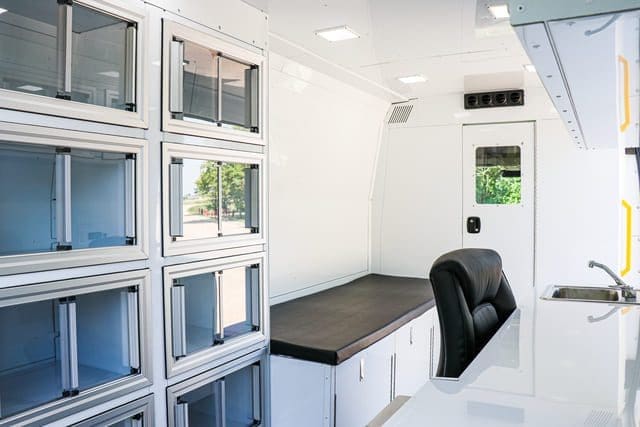
If you’re having some trouble deciding which option to take between mobile clinics and brick-and-mortar clinics, consider the following points:
Start with your community’s needs
Every organization is different, but your mission drives the decision.
If your goal is to break barriers like transportation, mobility, or stigma, then a mobile clinic in Texas could be the better fit. Unlike fixed clinics, mobile units meet people where they are, especially in areas with poor infrastructure.
Did you know? Over 2 million Texans don’t have access to a personal vehicle, making it tough to get to traditional clinics.
Mobile health clinics in Texas make healthcare more accessible by:
- Parking in neighborhoods, schools, or shelters
- Reducing no-show rates and travel time
- Reaching people who avoid care due to stigma
If you’re working with seniors, people experiencing homelessness, or those in rural towns, a mobile medical van in Texas may be your best bet.
Think about your budget and long-term plans
Cost matters, but so does reach and flexibility.
Building a fixed clinic can cost millions, especially in Texas cities where property costs are high. A Texas mobile medical unit gives you more control and movement without the need for a permanent building.
Compare these options:
- Fixed clinics require high startup costs, long-term leases, and zoning approvals
- Mobile clinics have a lower up-front cost, as you learned from the video earlier, and can start serving people right away
If you want to scale your services or serve multiple areas, a mobile health unit in Texas lets you do that with one vehicle. It’s a great way to test new service areas without committing to real estate.
Who are you trying to reach?
Your audience should guide your clinic setup.
A mobile health clinic in Texas is a wise option if you’re trying to support people in rural towns like Big Spring, Palacios, or Eagle Pass.
Use a mobile medical clinic in Texas if you’re focused on:
- Pop-up clinics at shelters or food banks
- School-based outreach programs
- Reaching migrant farm workers or unhoused communities
If you’re mainly serving one neighborhood with stable infrastructure and lots of walk-ins, a fixed clinic might work. But if your audience is constantly moving or facing transportation barriers, mobility is key.
Consider staffing and daily operations
Your team’s size and structure matter.
A mobile medical van in Texas typically runs with a small, focused team. This can be easier to manage, especially for nonprofits or new programs. On the other hand, fixed clinics might need more staff, more space, and longer hours.
Here’s what to ask:
- Do you have staff who enjoy travel and outreach work?
- Can your team handle the setup and logistics of a mobile unit?
- Would a smaller team work better for you?
Mobile healthcare in Texas is often faster to launch, with lower overhead and fewer moving parts. It lets you focus on care, not just administrative work.
What’s your long-term impact goal?
Don’t just think short-term. Think about what success looks like.
If your mission is to break barriers to healthcare, including:
- Transportation challenges
- Limited mobility (seniors, disabilities)
- Stigma around certain types of care
Then a mobile medical clinic in Texas helps you get there. You’ll bring care to where people feel safe and supported.
Bottom line:
- A fixed clinic is good for consistency in one place
- A Texas mobile medical unit creates access across many places
The more flexible you are, the more lives you can impact. That’s why so many Texas organizations are turning to mobile healthcare as their main strategy.
Got any questions about starting a mobile clinic in Texas?
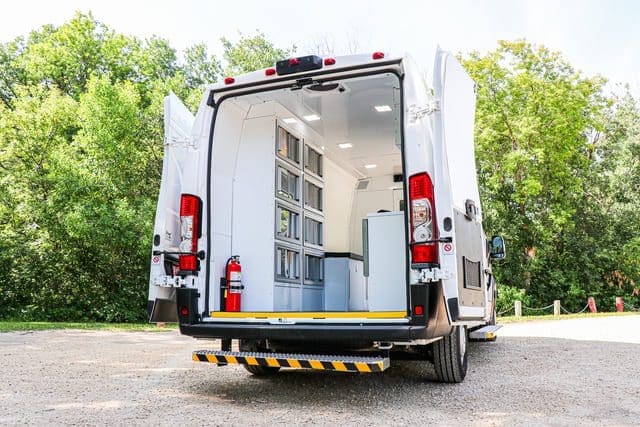
You’re likely here because you’re facing a tough choice. You want to make healthcare more accessible, but you’re unsure whether a mobile clinic or fixed clinic is the right path, especially with the unique challenges across Texas.
Here’s what you’ve learned:
- The key pros and cons of mobile clinics vs. fixed clinics
- Why mobile clinics work so well in rural and underserved areas of Texas
- How mobile clinics break barriers in transportation, stigma, and mobility
- What to consider when deciding what fits your mission and community
At AVAN Mobility, we build lifelines on wheels. We’ve helped 100+ organizations launch mobile medical clinics nationwide that serve people where they are, not where the care happens to be. Our vehicles are custom-built, designed for comfort and efficiency, and ready to roll into the places that need them. We’re proud to be a trusted partner for healthcare leaders across the country who believe that care should come to the people, not the other way around.
We believe in healthcare without walls. If you’re ready to break barriers and bring care to more Texans, click the button below to talk to a mobility expert.
If you’re not quite ready yet, we’ve got a few other helpful resources you can check out to learn more.
Start by learning about a Discovery Call with our team at AVAN Mobility and what you can expect.
After that, you might also be curious about your purchasing process. Check out our article on that to learn more!
